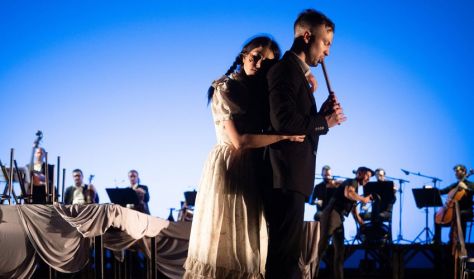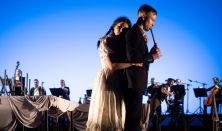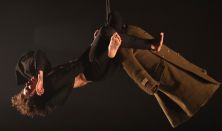The performance presents the well-known archetypes of Mozart's opera, but specifically focuses on their emotional relationships. Based on Géza Fodor's opera analysis, their actions are presented as “personal solutions to the life problem of love arising from their deepest and most vivid character traits".
A casual setting for this is the wedding, an act that condenses life events in a shocking way. Since the beginning of the world, this has been the procedure meant to determine the quality of the young couple’s future life, and the guests draw far-reaching conclusions from the moments, superstitions and games that take place there... Thus, the happiest day is also the frustration of the pressure to conform. The lovers Tamino and Pamina are facing this challenge in the company of the parents, Sarastro and the Queen of the Night, the best man, Monostatos, the good friend Papageno and the invited relatives.Hungarian folk song and folk dance, especially their Transylvanian dialects reveal relationships between couples and shockingly define and present the relations of male and female values. At the same time, it is a novelty in the genre of dramatic folk dance that dance, music, singing, text and shadow play can appear as equal instruments, just like on opera stages. The folklore orchestra accompaniment extended with a string quartet, the folk song lyrics and the texts drawn from the style of Mihály Vitéz Csokonai, the most original poet of the Hungarian Enlightenment, and the unique visuals of the shadow play technique provide a special background to the contemporary implementation of the choreographer's and the director's visions, which is formally based on the collision of the values of our time.
The figures placed intoday's environment, speaking an archaic language, and mixing everyday clothes with folk costumes, present an anachronistic community stuck between the past and the future.
Performed by
Dániel Bodnár, Diána Santana Cadena, Tamás Józsa, Gábor Kovács, Fanni Sosovicza, Melánia Tóth
Tamino: Márton Béhr
Pamina: Nóra Kovács-Gál
Sarastro: János Appelshoffer
Éjkirálynő: Tünde Rémi
Papagena: Melinda Balogh
Papageno: Gábor Molnár
Monostatos: Zoltán Görög
Folk Band: Zsombor Cseszák, Sándor Csoóri, József Csurkulya, Viktor Pandák, Tamás Jean-Pierre Bősze, István Babindák
Anima Musicae Chamber Orchestra: László G. Horváth, Tamás Szabó, Tamás Bartók, Benjamin Horváth
Dramaturge: Nóra Sediánszky
Composer: Zsigmond Lázár
Sound engineer: János Mazura
Head of lighting: Lászó Jakab
Assistant Director: Emőke Sárosi
Choreographer: János Appelshoffer, Tünde Rémi
Production Manager: Ferenc Tóth
Staged and directed by: Péter Novák, based on Mozart's opera The Magic Recorder










